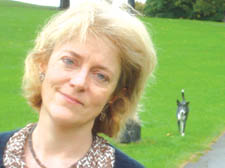|
|
 |
| |
 Lissa Evans researched the lesser-known stories of the Second World War Lissa Evans researched the lesser-known stories of the Second World War |
On frontline of movie-making
A new novel pays homage to the life of scriptwriter Diana Morgan who was drafted into the male world of film propaganda during the war, writes Dan Carrier
Their Finest Hour and a Half.
By Lissa Evans. Doubleday £14.99
SHE was nicknamed “The Welsh bitch”, and, while it may be grossly offensive, it was seen by Diana Morgan as a mark of the esteem in which she was held by her male colleagues.
Morgan was a leading writer at Ealing Studios, having joined the famous film production company during the Second World War to help fill the gaps left by the call-up.
She had enjoyed various West End successes with her work in the 1930s and her ability to write snappy dialogue for female actors made her key to the script department.
Morgan died in 1997, but has been given new life by Gospel Oak-based novelist Lissa Evans in her latest book, Their Finest Hour and a Half.
Telling the story of a film unit charged with raising our spirits and winning American sympathy, its leading lady is a Welsh script-writer. The novel was last week long-listed for the Orange Prize.
“I was writing about a woman in a man’s world,” says Lissa. “I knew of Diana and she fitted the bill for my lead.”
The story starts in 1940. France has been crushed by the German army and Hitler is now bombarding Britain as he plots an invasion. America has yet to step in and Britain stands alone.
Catrin Cole is a young Welsh copywriter, who usually pens ditties for an advertising campaign selling “Bee-Fee-Ooo” gravy granules. But then her country comes calling and her skill at writing everyday dialogue between housewives means she is needed to help create lines for the Ministry of Information’s film unit as the all-male team struggle to inject realism into the female roles.
Cole is asked to look into a story of Dunkirk bravery, of how two sisters headed to the French beaches to find and rescue a loved one – the nation needs a morale-boosting flick.
It draws, Lissa admits, greatly on the life of Morgan – and it is this realism that makes her dark comedy about making propaganda films so enjoyable.
“Diana was asked to write the sloppy stuff – the stuff the male script-writers called ‘the nausea’,” says Lissa.
“This was a time when people ended up doing jobs they would not have done unless the war was on.”
The same happens in the novel. Conscription has skimmed off the cream of the film industry, and the producers are left with assorted misfits, chief among them the ageing male lead, Ambrose Hilliard.
This is a figment of Lissa’s imagination – although she says many of the tales of gallantry at Dunkirk can only be guessed at.
“There was a Peggy Ashcroft film about a woman who dressed as a man and went to Dunkirk to help rescue people,” she said. “And there are just so many extraordinary stories linked to Dunkirk that there may well have been women going over there.
“I read a lot of first-person testimonies. There were so many accounts by air-raid wardens, fire officers. It gave me a sense of what it was like.”
Lissa’s own work behind the cameras for programmes such as Father Ted and Room 101 meant she had further experiences to draw on. But writing was not her first career.
She worked for three years in a Newcastle hospital as a junior doctor. “I simply hated it,” she says. “It was the 1980s and I was working 90 hours a week.”
But she also recognised a type of humour she could draw on as she wrote, produced and directed comedy for BBC Radio.
“I have to say there are lots and lots of very unfunny doctors,” she adds. “But there is also a lot of grim humour with the profession – you find laughter in places that are really just not that funny.”
A point she has proved by taking on one of the nation’s most traumatic military experiences and using it as the basis for a hilarious book. |
 |
|
 |
 |
|
 |
|
 Lissa Evans researched the lesser-known stories of the Second World War
Lissa Evans researched the lesser-known stories of the Second World War
